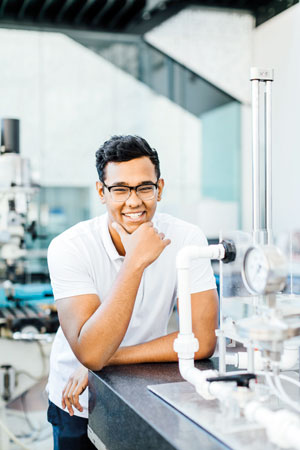Solving today’s challenges at the University of Melbourne
View(s): Ranked sixth in the world for graduate employability*, the University of Melbourne is the institution of choice for 10,000 engineering and IT students from over 100 countries around the world.
Ranked sixth in the world for graduate employability*, the University of Melbourne is the institution of choice for 10,000 engineering and IT students from over 100 countries around the world.
Taught by leading academics, the Master of Engineering offers graduates access to industry and research projects, problem-based learning and a degree they can take around the world.
It is the first engineering master’s programme in Australia to have dual accreditation via the Washington Accord and European accrediting system, EUR-ACE®.
For Randula Dias, studying the Master of Engineering (Mechanical) at Melbourne has meant gaining “hands-on” experience in his field.
“I’m not just learning the theory, I’m actually applying it,” Randula said.
Working with fellow students in and beyond the classroom, Randula has applied his studies to a host of real-world projects, from constructing carbon fibre sheets for a race car to designing a helicopter for extreme altitude rescues.
“We’re challenging today’s problems and not problems that have already been solved,” he said.
To become a professionally accredited engineer at the University of Melbourne, students complete an undergraduate degree with an engineering major, followed by the Master of Engineering.This unique study model enriches the student experience by offering students technical depth as well as the soft skills to give them a competitive edge in the workforce.
Randula enrolled in the Bachelor of Science, majoring in mechanical engineering, before undertaking the Master of Engineering (Mechanical). He cites the exposure this has given him to different ways of thinking as one of the key benefits of his study pathway.
“During my bachelors degree I took chemistry and biology subjects that were not directly in my mechanical engineering stream. I also had the chance to do subjects like Principles of Business Law, Principles of Accounting and many other electives outside of my immediate interest,” he said.
“It allowed me to experiment and learn so much more about all the pathways available. It also helped solidify my decision to go into mechanical.”
Randula’s breadth of studies meant he was well-prepared when it came time to undertake an internship in his master’s degree. Working with a large train manufacturer, Randula applied his skills and knowledge to areas beyond mechanical engineering, gaining experience in electrical and software engineering as well.
“The internship showed me how to embrace complex tasks with a dedication to learn and think outside the box.”
For students considering the move to Australia, Randula encourages networking and getting to know your peers.
“Get involved in as many student clubs and societies as you can,” he said.
“They really give you an appreciation of what you can do and how you can apply your engineering knowledge.”
For more information about the engineering and IT courses offered at the University of Melbourne, visit: http://go.unimelb.edu.au/4mcx
*QS Graduate Employability 2019.


